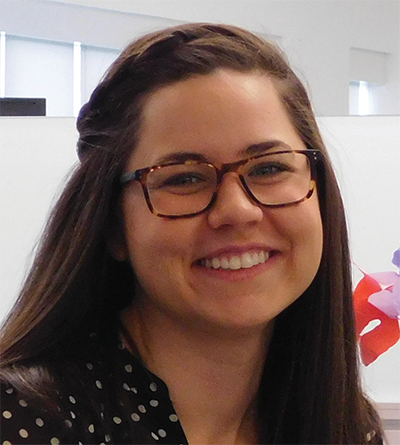From art to proteomics: a path to science
Jenn Abelin is now a group leader at working toward developing personalized cancer vaccines, but growing up in Connecticut, she didn’t want to do science at all. She wanted to do art.
 Jenn Abelin’s lab generates data to help decode rules for how human leukocyte antigens present peptides.
Jenn Abelin’s lab generates data to help decode rules for how human leukocyte antigens present peptides.
“In high school,” she said, “most of the classes I took were writing, reading, art and math.”
Looking back on these choices, she sees an emerging interest in recognizing patterns. But she got her initial push toward science from her grandmother, who encouraged her to study something more practical than art.
She picked a random class at Guilford College about ancient medicine; that set off a chain of events and introduced her to many role models and mentors in science who encouraged her. She took organic chemistry taught by her undergraduate advisor Anne Glenn and loved the idea that just memorizing facts and spitting them back out wasn’t going to cut it. She saw there was real creative thinking and problem solving in science.
Before she knew it, she was majoring in biology and chemistry and doing proteomics research. She went on to pursue her Ph.D. at the University of Virginia mentored by and Jeffrey Shabanowitz, studying cancer with mass spectrometry-based proteomics. As a postdoctoral researcher at the Broad Institute, she was mentored by , and .
Now as a leader of a research lab doing groundbreaking work, Abelin says the best part of her job is getting to work on basic science that directly impacts people’s lives for the better.
Outside the lab, she believes it’s important to share her path. She wants young people to know that to be a successful and happy scientist, you don’t have to start as a genius baby doing calculus in your high chair. When she was a kid, she was “likely eating dirt,” she said, and doing other average kid stuff.
“I hope to be able to do mentoring in the future,” she said. “I’ve had the most amazing mentors during my career, and I hope to continue that.”
Abelin is one of four young investigators chosen by the editorial team of the journal Molecular & Cellular Proteomics to present their research at the 91”∞ø‚annual meeting.
Using mass spectrometry to develop personalized cancer immunotherapies
Jenn Abelin’s work focuses on generating data that helps predict peptide antigens presented by cancer cells, with the goal of creating personalized immunotherapies to help patients’ immune systems fight their cancers.
To do this, researchers must understand how cells’ human leukocyte antigen, or HLA, complexes present antigens from inside the cell. The HLA complex presents to the immune system peptides from many proteins within cells. If those presented are self-peptides, the immune system does not react. However, if the peptides are from something non-self, like a virus, the immune system attacks the cell. Personalized cancer vaccines work by training the immune system to attack the cells presenting peptides that are unique to cancer. For this to work, however, we must know what these peptides are.
Humans have six HLA proteins that function in different combinations in each of us, and each of these combinations favors different peptides. Using high-throughput mass spectroscopy, Abelin’s group has generated data to help decode a set of rules for how HLAs present peptides. With these data, Neon Therapeutics can predict with high accuracy what neoantigens may be presented by tumor cells and can be used as targets for personalized immunotherapy.
Enjoy reading 91”∞ø‚Today?
Become a member to receive the print edition four times a year and the digital edition monthly.
Learn moreGet the latest from 91”∞ø‚Today
Enter your email address, and we’ll send you a weekly email with recent articles, interviews and more.
Latest in People
People highlights or most popular articles

91”∞ø‚committees welcome new members
Members joined these committees: Education and Professional Development, Maximizing Access, Meetings, Membership, Public Affairs Advisory, Science Outreach and Communication, Student Chapters and Women in Biochemistry and Molecular Biology.

Cadichon honored for academic achievement
She won the State University of New York at Old Westbury’s Dr. Henry Teoh Award for Outstanding Collegiate Science and Technology Entry Program Graduating Senior, which recognizes exceptional achievement, leadership and promise in a student.

In memoriam: Ralph G. Yount
He was a professor emeritus of chemistry and biochemistry at Washington State University and an 91”∞ø‚member for 58 years.

From dust to discovery
From makeshift classrooms in Uganda to postdoctoral research in Chicago, MOSAIC scholar Elizabeth Kaweesa builds a legacy in women’s health.

Fliesler wins scientific and ethical awards
He is being honored by the University at Buffalo and the American Oil Chemists' Society for his scientific achievements and ethical integrity.

Hope for a cure hangs on research
Amid drastic proposed cuts to biomedical research, rare disease families like Hailey Adkisson’s fight for survival and hope. Without funding, science can’t “catch up” to help the patients who need it most.

